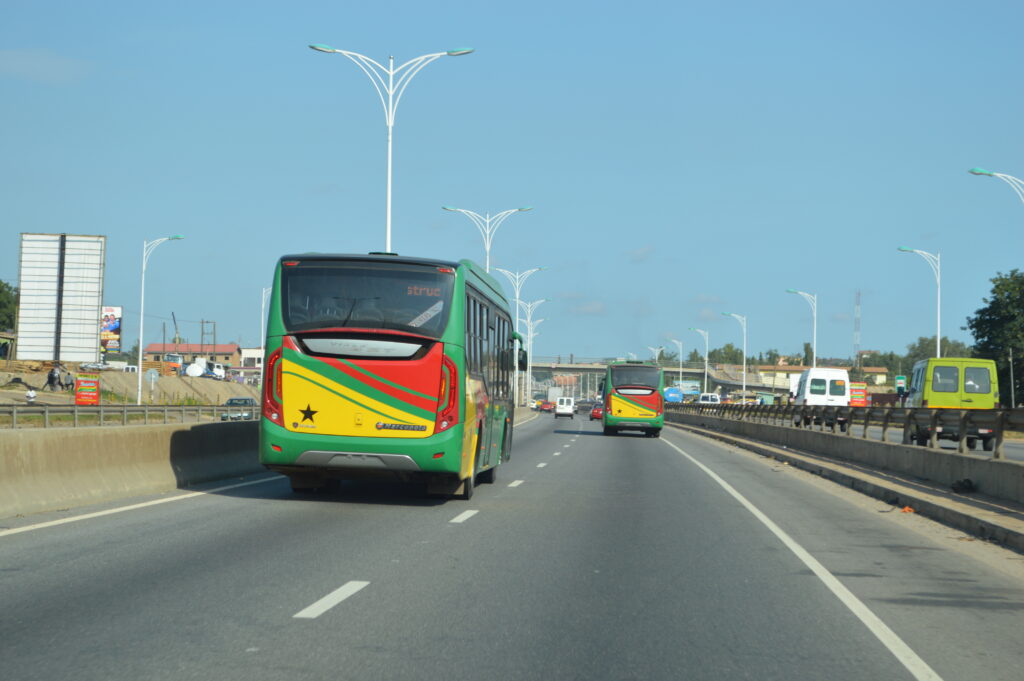Navigating urban spaces in Ghana has been hellish, especially for 43-year-old Alhassan Seidu, who relies on a wheelchair because of his physical disability.
For him, even the simplest commute within Accra means facing frustration and discrimination from commercial transport operators like taxis and minibuses (also known as “trotros”).
“Immediately they see you with physical challenges or visual impairment, they find ways and means just to stop you from boarding their vehicles,” said Seidu.

About 3 percent of Ghana’s 30 million population has a disability. Ghana first passed laws to protect persons with disabilities in 2006.
The law mandates a disability-friendly transport space in the Persons With Disability Act and prescribes sanctions for flouting it.
Persons With Disability Act: “The Ministries responsible for rail, air, and road transport and where appropriate, the Ministry of Local Government shall ensure that the needs of persons with disability are taken into account in the design, construction and operation of the transportation network.”
The law could, however, be described as having significant gaps, given it makes no mention of modes of transport that may not be buses (e.g, taxis and commercial motorbikes).
It has been almost 20 years, and there isn’t a single legislative instrument to govern the enforcement of the act. A legislative instrument would perhaps speak to Seidu’s specific challenges.
He is unable to fit his large pedal wheelchair into a vast variety of private transport vehicles. To make matters worse, bigger state buses do not operate around his home in Chorkor, a suburb of Accra.
The best options he has, when he can afford it, are the taxis resembling station wagons, where there is enough space in the rear area to fit his large wheelchair.
Discrimination is also a hurdle that is holding people like Seidu back.
Most times, he is forced to charter the taxi, which is generally at four times the cost because of prejudice against persons with disabilities.
“Some feel that if they take you and other passenger see, they will not join their cars,” he said.
“I fight with Uber drivers all the time. If you order them, and they come, and they see that you are a disabled person, their attitude and behaviour change.”
Raphael Nkegbe, a para-athlete
Ride-Hailing Platforms Don’t Offer Much Help
Ride-hailing firms operating in Ghana have done little to alter this dynamic for individuals with special mobility needs.
For example, there are no wheelchair-accessible vehicle options on local ride-sharing platforms.

“In Ghana’s system, I don’t know if they took all these things into consideration. They are just operating; Uber, Yango, Bolt, without including people with disabilities,” lamented Raphael Nkegbe, 46, one of Ghana’s most prominent para-athletes.
Beyond the absence of accessibility options, persons with disability have complained that drivers working with ride-hailing firms have been openly discriminatory to people with disability.
“I fight with Uber drivers all the time,” noted Nkegbe. “If you order them, and they come, and they see that you are a disabled person, their attitude and behaviour change.”
Matthew Kodom, the President of the Ghana Society of the Physically Disabled, has been at the forefront of efforts to change attitudes towards persons with disability in the transport space and beyond.
But dormant laws are holding back his organisation’s activism.
“The law is there barking, but it can never bite. That is the situation we find ourselves in,” said Kodom.
“There has not been even one punitive measure on any of the transport organisations when they do things that hinder persons with disabilities who want to board their various taxis.”
Accessibility as an afterthought
Clement Ayagah, the head of welfare operations for the Ghana Private Road Transport Union at the busy Tetteh Quarshie transport yard, said most drivers did not know their legal obligations to persons with special mobility needs.
He acknowledged that the terminals where he is based, which serve about 30 communities, are not disability friendly.
Despite offering the most affordable form of transport, the typical private transport station is located in areas difficult for wheelchair access, and there are seldom railings that guide persons with visual impairments, if any at all.
At Ayagah’s station, for example, opposite the Accra Mall, a person in a wheelchair would struggle to manoeuvre the curbs and rough road that lead to the waiting buses.

He conceded that his union, the largest for private commercial drivers in Ghana, could have an internal disability policy to govern their operations and make life easier for persons with disability who patronised them.
That said, he assured that union members at his station tried to meet the needs of people with special mobility needs as best as they could.
“At least, you, the officer, will instruct them to go and help that person to the car. It is unofficial policy,” said Ayagah. “At times, we tell drivers not to take money from them.”
Drivers are also known to offer the more spacious front passenger seats in commercial minibuses, known as trotros, to persons who use crutches.
Persons Wit Disability Act – “A person responsible for the booking of passengers on a commercial bus shall reserve at least two seats for the persons with disability except that where the bus is full without the reserved seats having been occupied, the driver or the person responsible for putting passengers on the bus may, fill the reserved seats with other passengers.”
These are moves in the right direction, and Kodom said his association has met with private transport operators to discuss the possibility of more inclusive and disability friendly vehicles.
But he feels it is ultimately a numbers game. There are not enough persons with disabilities relative to the daily demand to move private operators.
“Anytime we meet the transport owners, they say it is very difficult for them to import those kinds of buses into the country.”
Ignored By The State
For Felix Ntosu, a lawyer and disability rights activist, sensitisation of drivers on the disability act should be the first remedy, given the dominance of the private sector in the transport space.
“With the [dominance of] trotros moving about, if you want to enforce the law, how many of them will be left on our roads?”
Ntosu was more critical of the public sector, which he said was setting a terrible example when it comes to disability rights.

State transport mediums like trains, inter-city, and intra-city buses generally fail at catering to citizens with special mobility needs.
“Even buses with seats intended for persons with special needs are taken up by able-bodied persons,” Ntosu noted.
There was a decade-long moratorium to allow all stakeholders to put in place measures to include persons with disabilities in their operations. The government has largely failed on this front as far as transportation is concerned.
The Labari Journal’s requests for comment from the Transport Ministry on issues relating to the enforcement and sensation on the disability act were not honoured.
At a forum to mark the 2025 National Day for Persons with Disability on June 24, 2024, Deputy Education Minister Clement Apaak said the government planned to re-enact the Persons with Disability Act and also provide a Legislative Instrument to ensure better enforcement.
One thing Ntosu wants to see is a legal challenge of the state’s failings on the issue of disability rights, given the widespread disregard in the public sector.
“We have not tested [the disability act] in any way. To test it, you send it to the courts.”





